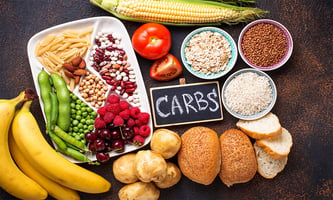As a performance physical therapist, I see firsthand the importance of nutrition for my clients....
Healing Strong: Why Protein is Essential for Injury Recovery
When you’re recovering from an injury, it’s easy to focus on what you shouldn’t do. Don’t push too hard too soon, don’t skip your rehab exercises, and don’t ignore your body’s signals. But what about what you should do? One of the most important steps you can take to speed up healing and come back stronger is fueling your body with the right nutrients – and at the top of that list is protein.
Protein: The Building Block of Recovery
Protein is often called the building block of life, and for good reason. It’s made up of amino acids, which your body uses to repair tissues, including muscles, tendons, and ligaments. When you’re injured, your body’s protein demands skyrocket. From regenerating damaged tissues to supporting the immune response that reduces inflammation, protein plays a starring role in your recovery. Let’s dive a little deeper into the key ways protein helps you heal:
- Tissue repair and growth: after an injury, your body needs to rebuild damaged tissues. Amino acids from protein provide the raw materials for this repair process. Whether it’s a torn muscle or a fractured bone, protein is essential for recovery.
- Reducing muscle loss: injuries often mean less activity, which can lead to muscle atrophy (loss of muscle mass). Consuming enough protein helps preserve your muscle tissue even when you’re sidelined.
- Boosting immune function: healing involves inflammation, which is part of your body’s natural defense system. Protein supports your immune system by helping produce immune cells that fight infection and manage inflammation.
- Improving collagen production: collagen, a protein, is critical for the strength and elasticity of tendons, ligaments, and skin. Eating enough protein—along with collagen-rich foods and foods that support collagen production—can enhance the repair of connective tissues. Foods that contain vitamin C, zinc and copper will help to boost your body’s natural production of collagen.
How Much Protein Do You Need?
During recovery, your protein needs are higher than usual. While the average adult needs about 0.8 grams of protein per kilogram of body weight per day, someone recovering from an injury may need closer to 1.6-2.2 grams per kilogram. For example, a 70-kg (154-pound) individual might aim for 112-154 grams of protein daily.
Best Protein Sources for Recovery
To optimize healing, aim for a variety of high-quality protein sources, including:
- Lean Meats: Chicken, turkey, and lean beef are packed with complete proteins.
- Fish: Salmon and tuna provide protein and omega-3 fatty acids, which reduce inflammation.
- Eggs: A versatile and nutrient-rich protein source. Pasture raised eggs will be more nutrient dense than cage free and conventional eggs. In the photo, to the right, you can see the bright orange color of the yolk in the pasture raised eggs.
- Dairy: Greek yogurt, cottage cheese, and milk are excellent for recovery.
- Plant-Based Options: Lentils, chickpeas, tofu, tempeh, and quinoa are great for vegetarians and vegans.
- Protein Supplements: Whey or plant-based protein powders can help you meet your daily protein goals.
- Collagen rich foods:
- Bone Broth – Made by simmering animal bones, it's one of the best natural sources of collagen.
- Chicken Skin – A rich source of collagen, commonly used in supplements.
- Fish and Shellfish – Particularly the skin and scales, which contain high amounts of collagen.
- Egg Whites – High in proline, an amino acid crucial for collagen production.
- Organ Meats – Such as liver and heart, which are naturally rich in connective tissues.
- Additionally, eating foods high in vitamin C, zinc, and copper can boost your body's natural collagen production. Examples include citrus fruits, leafy greens, nuts, and seeds.
Timing Matters:
To maximize protein’s benefits, spread your intake evenly throughout the day. Aim for 25-30 grams of protein per meal and include a protein-rich snack post-rehabilitation exercises to support muscle repair. Especially for women, consuming protein within 60 minutes of finishing a workout will be the most beneficial to support muscle repair and growth.
Now that we’ve covered the why behind the importance of protein, let’s dive into a few easy ways to make it happen!
Starting your day with a protein rich breakfast will not only help you toward your protein goals, but set you up for success by stabilizing your blood sugar. Keep reading for some high protein breakfast and post-workout snack ideas!
Start your day with these protein-packed breakfast recipes:
- Greek Yogurt Parfait
- 1 cup Greek yogurt (20g protein)
- ½ cup granola (bonus points for homemade!)
- 1 handful of mixed berries
- 1 tablespoon chia seeds (fat, fiber and protein!)
- Egg and Avocado Toast
- 2 slices of whole-grain bread (or sourdough!)
- 2 eggs (12g protein) + 2-4 egg whites for extra protein (8-16g)
- ½ avocado
- Sprinkle of red pepper flakes and salt
- Collagen rich foods:
- Turkey Hash
- Cook 1 lb ground turkey with a large diced sweet potato and a few spices, such as salt, pepper and cinnamon. This is my go to week day breakfast that is easy to prep for the whole week! This comes in at about 22g protein from the turkey + 12g protein from the eggs.
- Optional add ins: onions and veggies of choice
- Optional toppings: 1-2 eggs, avocado
Refuel after your workout or rehab exercises with these quick and easy snacks:
- Tuna Salad Wrap
- 1 whole-grain tortilla
- 1 can of tuna (25-40g protein)
- 1 tablespoon Greek yogurt or avocado (instead of mayo)
- Lettuce of your choice
- Cottage Cheese and Fruit Bowl
- ½ cup cottage cheese (14g protein)
- Fruit of your choice - berries, pineapple, banana etc.
- Drizzle of honey
Recovering from an injury is a team effort, and protein is your MVP. By making protein a priority in your diet, you’re giving your body the tools it needs to heal faster and stronger. Pair that with a smart rehabilitation plan (guided by your favorite performance physical therapist, of course), and you’ll be back to crushing your goals in no time!
So, what’s on your plate today? Let’s make it protein-packed and recovery-focused!
Stay tuned for next month’s blog where we deep dive pre-workout fuel!
In good health,
Dr. Eliza Cohen
Performance Physical Therapist + Wellness Consultant
Wilmington, NC
Follow here for more performance and nutrition tips: @conquermovementpt @doctor_cohen14





Leave A Comment: